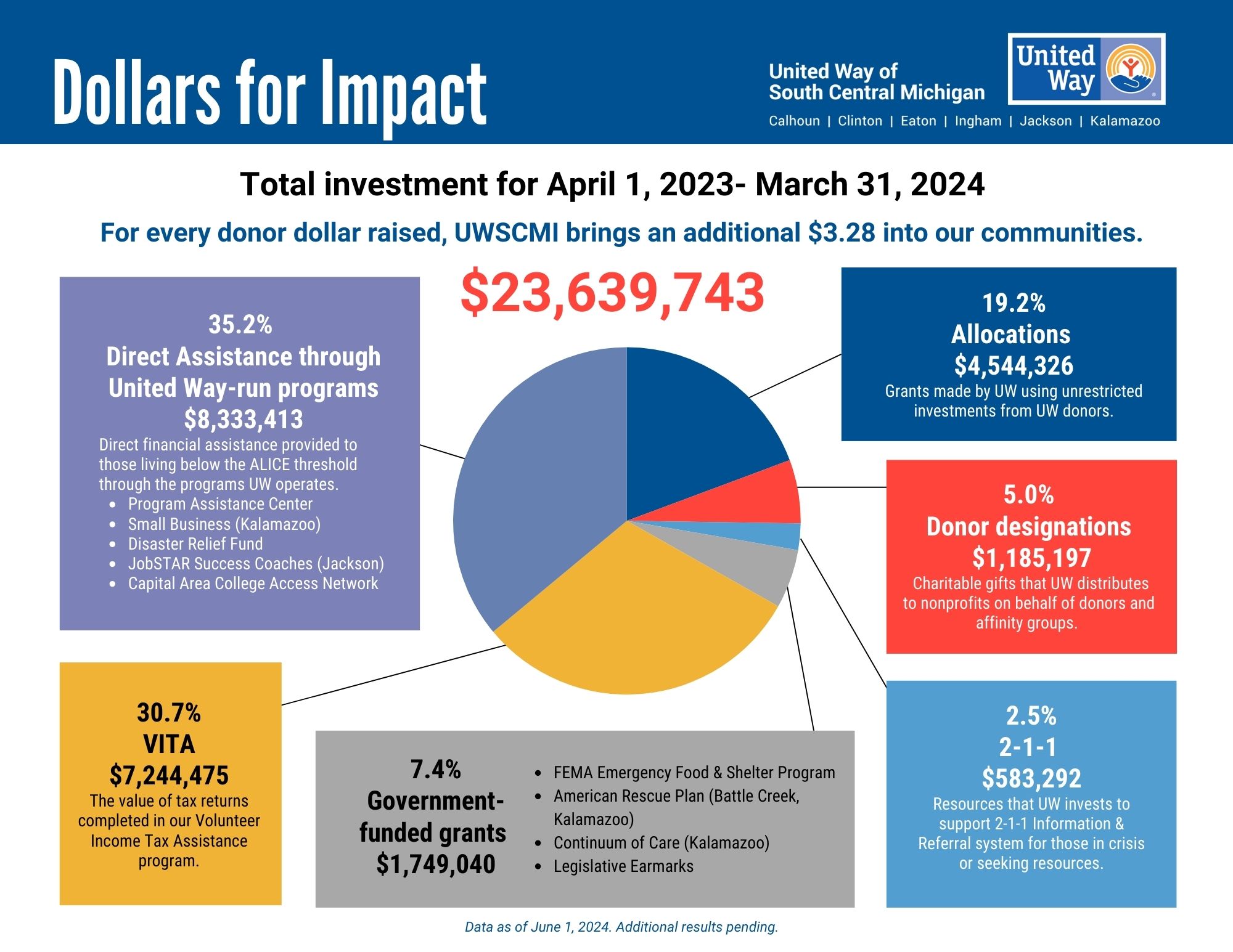
BATTLE CREEK/JACKSON/KALAMAZOO/LANSING, Michigan – United Way of South Central Michigan (UWSCMI) announced that local support and outside grants in 2023-24 totaled more than $23.6 million to drive efforts addressing financial hardship and basic needs among households across six counties. UWSCMI also said it began the next round of local allocations — unrestricted dollars from United Way donors to fund local programs and partners tackling specific needs — totaling over $3.3 million.
UWSCMI recently completed its annual impact report, “We Show Up,” which details how dollars were invested through United Way-run initiatives and local partnerships during its 2023-24 fiscal year ending March 30. Here are the highlights:
- $8,333,413 in direct assistance through programs run by UWSCMI. These include its Program Assistance Center (utility assistance statewide), local business supports (including JobSTAR in Jackson and microbusiness grants in Kalamazoo), disaster relief, and higher-education access through the CapCAN program in the greater Lansing area.
- $7,244,475 to run the Volunteer Income Tax Assistance program, providing free tax preparation for low-income households across nine counties.
- $4,544,326 in local allocations, over and above other programs and investments listed here.
- $1,749,040 in government grants primarily supporting food, shelter and other basic needs.
- $1,185,197 in donor-designated investments, which are restricted gifts made by local donors through UWSCMI.
- $583,282 to help fund the 2-1-1 information and referral system, which connects people in need with available programs and resources.
Jen Hsu-Bishop (they/them), Executive Impact and Equity Officer for UWSCMI, said United Way was able to attract an additional $3.28 into the region for every donor dollar given.
“The breadth and depth of our programs and investments, coupled with the added dollars we brought into the region, really shows the value United Way brings to tackling the tough issues affecting individuals and families,” Hsu-Bishop said.
Chris Sargent (he/him), President and Executive Officer, pointed out how the impact of UWSCMI’s efforts demonstrate an even more crucial value: changed lives.
“Progress happens with the support and collaboration of donors, volunteers, corporate partners, funding organizations, government leaders and local agency partners,” Sargent said. “Together we all show up for our communities and for our fellow human beings. I couldn’t be more grateful.”
New Allocations Support Local Work
For the current fiscal year, UWSCMI is investing $3,330,429 through local nonprofit partners to support local programs.
“Local allocations are only part our overall investments, but they’re critical to targeting specific needs at a local level,” Hsu-Bishop explained.
Those investments emphasize the needs of people in financial hardship, including ALICE (Asset-Limited, Income-Constrained, Employed) households, those experiencing poverty, and persons who have been historically oppressed and marginalized.
Local allocations are tied to unrestricted donations made locally during UWSCMI’s annual campaign — keeping UWSCMI’s promise that local dollars stay local, Hsu-Bishop said. Here are the local allocations for the 2024-25 fiscal year:
- $2,780,430 to 60 programs run by 59 agencies in the Battle Creek and Kalamazoo area.
- $300,000 to 19 programs operated by 17 agencies in Jackson County.
- $250,000 to 18 programs through 23 agencies in the Capital Area.
In addition to those allocations, UWSCMI has already invested in key local programs since April 1, among them the Community Violence Intervention, a joint effort by the City of Kalamazoo and Kalamazoo County to address gun violence ($345,000); Seeding Health, which increases equitable access to health care for nonprofit employees in Battle Creek ($150,000); and managed the federal Emergency Food and Shelter Program ($466,232) in Capital Area, Jackson, and across UWSCMI’s six-county regionwide.
Hsu-Bishop acknowledged that local allocations are down compared to the previous fiscal year. They explained that it reflects the national trend in declining support for fundraising campaigns through workplace giving.
“That makes UWSCMI’s approach to tapping other resources based on our scale a vital strategy to keep dollars flowing into our communities,” they said. “At the same time, we need local donors to keep fueling our work with financial support so that, together, we can deliver even greater impact.”
To read or download a copy of UWSCMI’s latest impact report, go to unitedforscmi.org/impact-reports. To make a financial gift to UWSCMI, unitedforscmi.org/donate.
